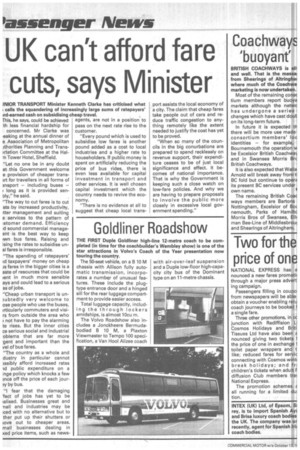UK can't afford fare cuts, says Minister
Page 12

If you've noticed an error in this article please click here to report it so we can fix it.
1NIOR TRANSPORT Minister Kenneth Clarke has criticised what calls the squandering of increasingly large sums of ratepayers' 1rd-earned cash on subsidising cheap travel. This, he says, could be achieved th less financial hardship for concerned. Mr Clarke was leaking at the annual dinner of
e Association of Metropolitan Jthorities Planning and Transsrtation Committee at the HalTi Tower Hotel, Sheffield.
"Let no one be in any doubt at this Government welcome e provision of cheaper trans)rt for travellers in all forms of 3nsport — including buses long as it is provided senoly," he said.
"The way to cut fares is to cut sts by increased productivity, ,tter management and suiting
e services to the pattern of kstomer demand. Efficiency
Id sound commercial manageant is the best way to keep Iwn bus fares. Raising and ising the rates to subsidise unal fares is irresponsible.
"The spending of ratepayers' id taxpayers' money on cheap is fares in the bigger cities is a aste of resources that could be ient in much more sensible ays and could lead to a serious ss of jobs.
"Cheap urban transport is unaubtedly very welcome to ose people who use the buses, irticularly commuters and visirs from outside the area who ) not have to pay the alarming to rises. But the inner cities ce serious social and industrial oblems that are far more gent and important than the vel of bus fares.
"The country as a whole and dustry in particular cannot )ssibly afford increased rates Id public expenditure on a Inge policy which knocks a few 3nce off the price of each jour3y by bus.
"I fear that the damaging fect of jobs has yet to be alised. Businesses great and 'nail and industries may be ced with no alternative but to ther put up their shutters or love out to cheaper areas. mall businesses dealing in xed price items, such as news agents, are not in a position' to pass on the next rate rise to the • customer.
"Every pound which is used to subsidise low fares is another pound added as a cost to local industries and a higher rate to householders. If public money is spent on artificially reducing the price of bus rides, there is even less available for capital investment in transport and other services. It is well chosen capital investment which the country needs to revive the economy.
"There is no evidence at all to suggest that cheap local trans port assists the local economy of a city. The claim that cheap fares take people out of cars and reduce traffic congestion to anything remotely like the extent needed to justify the cost has yet to be proved.
"When so many of the councils in the big conurbations are prepared to spend recklessly on revenue support, their expenditure ceases to be of just local significance and effect. It becomes of national importance. That is why the Government is keeping such a close watch on low-fare policies. And why we are having to prepare proposals to involve the public more closely in excessive local government spending."








































